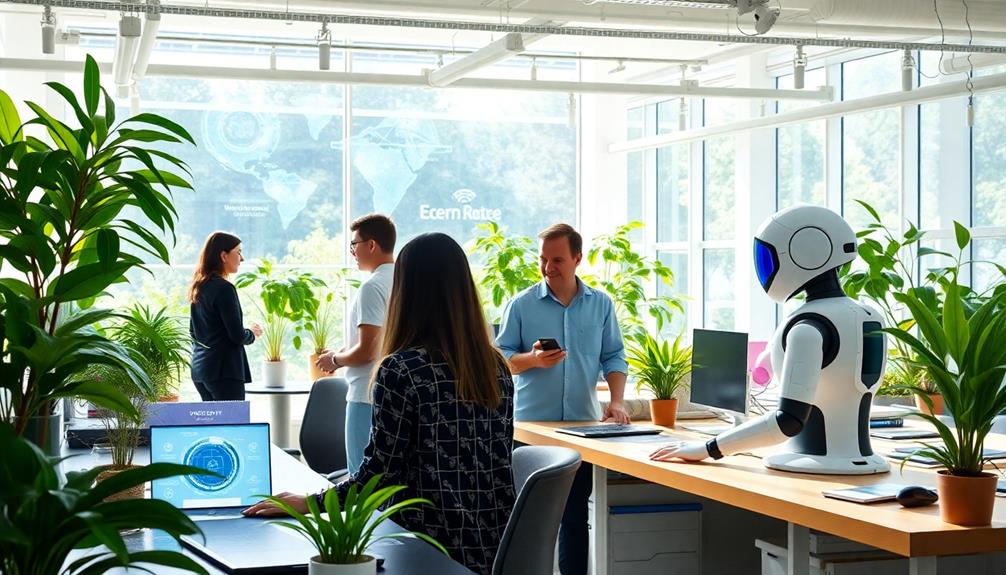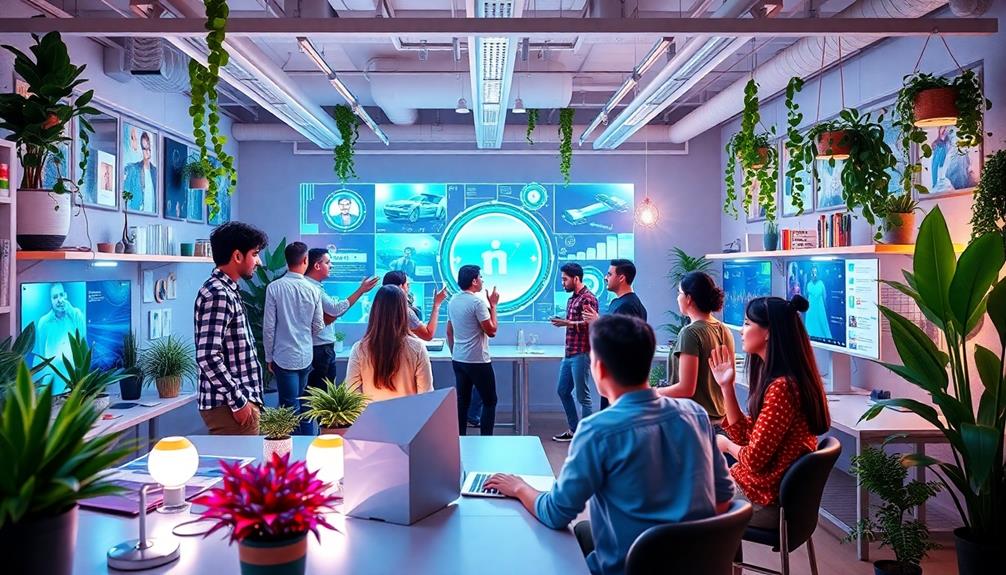Curiosity is essential for your career in the evolving workplace. When organizations value your inquisitiveness, they're 52% more likely to innovate and solve problems creatively. As jobs shift due to technology and automation, continuous learning is vital; 60% of workers will need new skills by 2027. Curiosity helps you adapt, enhances decision-making, and fosters collaboration, especially with AI. It also keeps you engaged and motivated in your role. By nurturing this trait, you position yourself for success and growth. Explore how cultivating curiosity can pave the way for your future career advancements.
Key Takeaways
- Curiosity drives innovation, with organizations prioritizing it being 57% more likely to develop groundbreaking solutions and adapt to change.
- Continuous learning fueled by curiosity is essential, as 60% of workers will need upskilling to remain relevant by 2027.
- As job roles evolve due to technology, curiosity fosters adaptability and aids in developing diverse skill sets necessary for future careers.
- Emotional intelligence, combined with curiosity, enhances collaboration in human-machine partnerships, vital for navigating the future workforce dynamics.
- Encouraging a culture of curiosity in organizations leads to increased employee engagement and retention, crucial for sustaining talent in a competitive landscape.
The Role of Curiosity in Careers

In today's fast-paced work environment, curiosity isn't just a nice-to-have; it's an essential skill for career success. As technology evolves, particularly with the rise of automation and AI, being curious allows you to adapt and thrive. Curiosity fuels your desire to learn, making you more resilient in the face of change.
By cultivating an abundance mindset, you can transform your perception of challenges into opportunities for growth and innovation, ultimately enhancing your career trajectory and emotional well-being through self-care routines.
Organizations that prioritize a culture of curiosity often drive innovation. Studies show that businesses embracing curiosity are 52% more likely to develop creative solutions. As you hone your soft skills, like curiosity and creativity, you position yourself as a valuable asset to your employer.
With projections indicating that 60% of workers will need upskilling by 2027, continuous learning becomes essential. Curiosity-based thinking empowers you to question AI-generated insights, enhancing your strategic decision-making and data analysis capabilities.
Employers are increasingly recognizing that soft skills such as curiosity are significant for traversing complex environments and fostering growth. By cultivating your curiosity, you not only improve your career prospects but also contribute to a more innovative workplace.
Embrace your curiosity—it's the key to revealing your full potential in today's ever-changing job landscape.
Shifting Workforce Dynamics

Curiosity isn't just shaping individual careers; it's also influencing broader workforce dynamics. As you navigate the Future of Work, you'll notice significant shifts, particularly with the rise of remote work and flexible schedules. Around 60% of workers will need skills training by 2027 to adapt to evolving roles.
The gig economy is transforming traditional employment, giving you more autonomy and flexibility. At the same time, companies are increasingly focusing on diversity; 79% prioritize women in their diversity, equity, and inclusion initiatives.
Here's a quick snapshot of these shifting dynamics:
| Workforce Dynamics | Current Trends | Future Predictions |
|---|---|---|
| Remote Work | Increased flexibility | 60% require skills training |
| Gig Economy | Greater autonomy | 85 million jobs displaced |
| Diversity & Inclusion | Focus on women | 97 million new roles in tech |
As automation and AI reshape job roles, continuous learning becomes essential. With 54% of retention linked to company support for professional development, fostering a culture of continuous improvement is vital for thriving in this evolving landscape.
The Impact of Technology

As technology transforms the workplace, you'll find that your job roles and skills need to adapt rapidly.
With automation on the rise, such as Amazon's robotics expansion and new positions emerging, staying ahead of the curve is essential for your career.
Embracing curiosity and learning will be key to maneuvering this evolving landscape and seizing future opportunities.
Technology's Transformative Role
Over the next few years, technology will reshape the workplace in ways we can only begin to imagine. Companies are gearing up to integrate big data, cloud computing, and AI, with over 75% planning to adopt these technologies within five years.
As automation rises from 34% to 42%, it's essential for you to stay ahead. The insights gained from startup stories can provide valuable lessons on how to navigate this changing landscape.
Here are three key trends to watch:
- Job Displacement: With an anticipated loss of 85 million jobs by 2025, understanding how to adapt is fundamental.
- Skills Demand: Roles in data science and AI engineering are booming, highlighting the need for skills that align with technological advancements.
- Training Needs: By 2027, 60% of workers will require training to thrive in this new landscape, yet many lack access to adequate resources.
In this evolving environment, honing your analytical thinking skills will become essential.
Companies that effectively integrate AI and automation are likely to see increased innovation and productivity. Embrace these changes, and you'll position yourself for success in a technology-driven future.
Skills Adaptation Necessity
Many workers find themselves at a crossroads as technology rapidly transforms the job landscape. With automation projected to displace 85 million jobs by 2025, it's essential for you to focus on skills adaptation.
While this shift may seem intimidating, it also creates opportunities, as an estimated 97 million new roles will emerge, highlighting the significance of lifelong learning.
By 2027, around 60% of workers will need skills training to remain competitive. The World Economic Forum warns that 44% of employee skills could become outdated within five years, making proactive upskilling and reskilling necessary.
Companies are increasingly prioritizing analytical thinking, creativity, and technological literacy—skills that are crucial for maneuvering a tech-driven workplace.
As organizations adopt skills-first hiring practices, adaptability becomes your greatest asset. Embracing continuous learning not only enhances your employability but also keeps you engaged and innovative in your career.
By committing to lifelong learning and staying abreast of technological advancements, you'll position yourself as a valuable contributor in an evolving job market.
Future Job Evolution
The impact of technology on job evolution is undeniable, reshaping industries and redefining roles. As we move toward 2025, you'll notice a significant shift in the job landscape. While 85 million jobs may be displaced, there's a silver lining: 97 million new roles are emerging, particularly in tech and green sectors.
To thrive in this changing environment, you'll need to embrace creativity and adaptability.
Consider these key aspects of future job evolution:
- Job Growth in Tech: Emerging opportunities in fields like data science, machine learning, and AI engineering are on the rise.
- Value of Creative Thinking: Employers increasingly seek diverse skill sets that enhance human-AI collaboration, emphasizing the importance of analytical thinking and emotional intelligence.
- Lifelong Learning: Staying updated on technology trends and industry shifts is essential for career resilience.
As industries like manufacturing and logistics face disruptions, you must proactively reskill and upskill.
Curiosity as a Skill

Curiosity isn't just a nice-to-have; it's an essential skill that drives innovation and keeps you ahead in today's fast-paced work environment.
By embracing lifelong learning, you empower yourself to adapt and generate fresh ideas that can transform your organization.
In a world where change is constant, being curious can make all the difference in your career success.
Curiosity Drives Innovation
In today's rapidly changing work environment, fostering a culture of curiosity can be a game-changer for innovation. When you encourage curiosity, you create an atmosphere that allows exploration beyond conventional solutions. This proactive approach helps your organization adapt to technological shifts effectively.
Consider these benefits of nurturing curiosity:
- Increased Agility: Companies that promote curiosity are 57% more likely to be agile.
- Enhanced Innovation: Organizations that foster curiosity see a 52% increase in innovation compared to traditional workplaces.
- Resilience: Curiosity-driven teams navigate disruptions better, making them more resilient in the face of change.
Curious employees are inclined to ask critical questions about AI insights, leading to creative brainstorming that can reveal novel strategies.
By embracing curiosity as a key skill, you're not just preparing yourself; you're also setting the stage for collaboration with AI that enhances productivity and drives organizational success.
In this evolving job landscape, curiosity isn't just a trait; it's a crucial driver of innovation that will shape the future of work for you and your colleagues. Embrace it, and watch how it transforms your workplace.
Lifelong Learning Importance
Embracing lifelong learning is essential for staying relevant in today's fast-paced work environment. With 60% of workers needing training by 2027, your ability to adapt is critical. Curiosity fuels this journey, encouraging you to explore new skills and knowledge.
The World Economic Forum projects that 44% of employee skills may become outdated in just five years, making a commitment to lifelong learning indispensable.
Organizations that foster a culture of curiosity not only enhance your learning experience but also boost their agility and innovation. Companies prioritizing continuous development see a 54% increase in employee retention linked to support for your growth.
This means that when you invest in your skills, you're not just benefiting yourself—you're contributing to a thriving workplace.
As technology adoption accelerates, particularly in fields like AI and big data, your curiosity will drive you to seek out new learning opportunities.
Fostering a Culture of Inquiry

A strong culture of inquiry can transform the workplace, encouraging employees to ask questions and explore their creativity. When you foster such an environment, curiosity becomes a driving force for innovation and improved decision-making processes.
Organizations that prioritize curiosity aren't just more agile; they're also better equipped to adapt to technological changes.
By cultivating a culture of inquiry, you can reveal numerous benefits:
- Enhanced problem-solving skills: Employees learn to simulate "what if" scenarios, revealing hidden opportunities.
- Increased innovation: A curious workforce is 52% more likely to develop novel strategies that enhance business performance.
- Effective AI utilization: Curious team members can better harness AI-generated insights for strategic use.
Emphasizing inquiry helps create resilience against changes, enabling continuous learning and adaptation to evolving job market demands.
When you encourage curiosity, your organization not only thrives but also prepares itself for the future. Embrace this culture, and watch as your team becomes more engaged, innovative, and equipped with the skills necessary to navigate the complexities of tomorrow's work landscape.
Adapting to Change and Innovation

Steering through the rapid pace of change and innovation requires organizations to stay agile and responsive. As you embrace this shift, fostering a culture of curiosity is essential. With 75% of companies planning to adopt AI technologies by 2027, using curiosity will help you leverage these innovations more effectively. Curiosity drives exploration and encourages asking "what if" questions, leading to the discovery of hidden opportunities and creative solutions.
Moreover, 60% of workers will need skills training by 2027 to adapt to evolving job demands. This highlights the importance of continuous learning in your professional development. Organizations that prioritize curiosity are 57% more likely to be agile and 52% more likely to innovate. By nurturing curiosity, you empower your team to adapt and thrive amidst disruption.
As collaboration between humans and AI becomes essential, curiosity will guide you in exploring AI's potential to enhance human capabilities and improve workplace dynamics.
Embracing change with an inquisitive mindset not only prepares you for the future but also positions you to harness the power of innovation effectively. Stay curious, keep learning, and watch your organization flourish in this ever-evolving landscape.
Continuous Learning and Development

In today's fast-paced job market, continuous learning and development aren't just optional—they're crucial for survival. By 2027, around 60% of workers will need training to keep their skills relevant. Yet, only 50% currently have access to adequate training, highlighting a significant gap that organizations must address.
To thrive in this evolving landscape, consider the following key aspects of continuous learning and development:
- Focus on Skills: Prioritize analytical thinking, which accounts for 10% of upskilling efforts. Creative thinking follows closely at 8%.
- Invest Wisely: Companies that invest in development programs often see a return on investment within a year, boosting productivity and employee mobility.
- Cultivate Culture: A strong culture of continuous learning is critical for attracting and retaining talent, with 54% of employee retention linked to perceived support for professional development.
Embracing continuous learning isn't just about personal growth; it's about staying competitive in a rapidly changing world. Companies that recognize this won't only enhance their workforce but also create an environment where everyone can flourish.
Curiosity in Leadership

Fostering a culture of curiosity is an essential component of effective leadership that complements continuous learning and development. When you embrace curiosity in your leadership approach, you're more likely to drive innovation within your organization—57% more likely, in fact. This mindset encourages questioning the status quo, allowing you and your team to explore novel strategies and improve problem-solving in dynamic work environments.
By prioritizing curiosity, you can greatly enhance employee engagement; research shows that 54% of retention is linked to perceived support for continuous learning. This not only keeps your talent invested but also equips you to navigate the complexities of AI integration.
As a curiosity-driven leader, you'll help your teams leverage technology while maintaining a human-centric approach to work.
Moreover, fostering curiosity can improve your decision-making processes. It prompts deeper analysis of data and insights generated through AI, leading to more informed business outcomes.
Ultimately, when you cultivate a curious mindset among your leadership team, you're setting the stage for a resilient organization ready to adapt and thrive in the future of work.
Future Career Pathways

Future career pathways are rapidly evolving, especially in tech-driven fields where demand for roles like data scientists and AI engineers is skyrocketing.
With the World Economic Forum predicting that automation will displace 85 million jobs by 2025, it's essential to prepare for the new opportunities that will arise.
You'll want to focus on developing a diverse set of skills that align with the future job landscape.
Consider honing the following:
- Analytical thinking: Important for understanding complex data and making informed decisions.
- Emotional intelligence: critical for collaboration in workplaces increasingly defined by human-machine partnerships.
- Lifelong learning: Embrace continuous skill development to adapt to the gig economy and remote work trends.
Emerging roles in healthcare, renewable energy, and cybersecurity are just a few areas where your skills will be in high demand.
By prioritizing adaptability and the integration of soft skills with technical expertise, you can position yourself for success.
As you navigate this evolving job market, stay curious and ready to embrace the changes that define your career's future.
Frequently Asked Questions
How Do You Shape the Future of Work?
To shape the future of work, you need to embrace change and stay adaptable.
Cultivating curiosity allows you to explore new ideas and technologies, helping you identify opportunities.
Engage in continuous learning to keep your skills relevant, and foster collaboration with others to drive innovation.
How Will the Workplace Change in the Future?
The workplace is set to change markedly in the future.
You'll likely experience a blend of in-person and remote work, offering more flexibility.
With automation and AI transforming roles, you'll need to adapt continuously, honing new skills to stay relevant.
Companies will prioritize abilities over traditional qualifications, emphasizing analytical and technological skills.
Embracing lifelong learning and curiosity will be essential for thriving in this evolving environment, fostering innovation and collaboration.
What Will the Future World of Work Look Like?
Imagine a workplace where flexibility flows like a river, adapting to your needs.
In the future, you'll find yourself maneuvering through hybrid models, blending remote and in-person interactions seamlessly.
As automation reshapes roles, you'll embrace continuous learning, sharpening your skills to stay ahead.
Collaboration with AI will become second nature, and curiosity will light your path, ensuring you thrive in a landscape where diverse skills and emotional intelligence reign supreme.
Embrace the change!
What Is the Future of Work Concept?
The future of work concept revolves around significant changes in how you approach your job.
It emphasizes remote work, flexible schedules, and the gig economy, allowing you to balance personal and professional life. Organizations are redefining what job security means, focusing on employee satisfaction and adaptability.
With technology driving these shifts, continuous learning and skill development become essential for staying relevant in your career, adapting to new roles, and steering through evolving workplace dynamics.
Conclusion
As you navigate the ever-evolving landscape of work, think of curiosity as your compass. It'll guide you through shifting dynamics, helping you adapt and thrive in a tech-driven world. Embracing a mindset of inquiry not only fuels your growth but also shapes your future career pathways. By fostering this skill, you'll open up endless possibilities and become a beacon of innovation in your field. So keep asking questions and let curiosity light your way forward.









